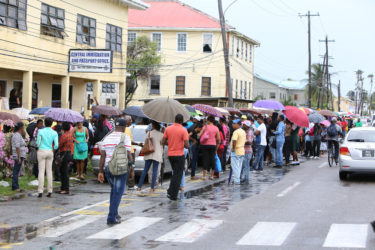With around 400 people turning up each day, the Passport Office has been stretched to the limit and Minister of Citizenship, Winston Felix has made a series of proposals to overhaul the system including making the office semi-autonomous and civilian-run.
Felix made the disclosure in a letter to yesterday’s Sunday Stabroek in reply to two missives in this newspaper from GHK Lall who had expressed concern about the conditions for passport applicants.
In recent weeks there has been a surge of applicants resulting in long lines spilling onto the road outside the Camp Road passport office. As a result of the large numbers that were turning up, Felix disclosed in the letter that he had instituted a numbering system with a cut-off point. This has meant that people – including some from out of town – have had to be turned away and told to return the next day.
When the build-up began, Felix had stated that it had been sparked by rumours of a steep hike in passport fees. However, even after a statement from him dispelling this, the numbers at the office have continued to grow. Observers have pointed to the five-year lifespan of the machine-readable passports, the return of a large number of overseas-based Guyanese and prospective applications for US visas as more plausible reasons for the rush to the Passport Office.

Felix, adverting to Lall’s letters of June 14 and June 30 noted that the Passport Office still falls within the ambit of the Guyana Police Force and is therefore technically the responsibility of the Commissioner of Police. Felix, a former Commissioner of Police said that he had presented a comprehensive plan before parliament with regard to the overhaul of the outdated systems. He said that it has been his recommendation that the passport office be made a semi-autonomous civilian-run facility in keeping with best practices overseas and it would then fall directly under the Department of Citizenship and this would “allow for a broad range of structural adjustments that are not possible under the current dispensation both legally and logistically.”
He said it would be “naïve to think that one could arbitrarily institute changes in any system without the concomitant legislative framework being implemented. The fact that these issues were never addressed during the previous administration’s tenure is testament to neglect, inexperience and/ or lack of concern for the people of this country and gives some indication of the amount of backlog the Granger administration must tackle, alongside keeping up with the day-to-day running of a country.”
He rapped Lall for suggesting that the government had been in place long enough to institute the changes. Observers have pointed out that the incoming government was well aware of what the issues were with the passport office but has not yet instituted needed reforms.
Felix said: “…It takes some 10 minutes to process a first-time applicant for a Guyana passport and using simple mathematics this would indicate that with the usual 400 daily arrivals at the office this would amount to 8 days of operation. During the recent spike in the number of daily applicants instigated by erroneous information peddled by forces out to create even more havoc, I had need to institute a system of numbering that has a cut-off point, so that the daily numbers could be reduced”.
He added that it is unfortunate that the building cannot accommodate all the applicants that turn up each day but that this was entirely dependent on the apportioning of funds from the government to the Police Force under which the department currently operates. Critics have said it is unacceptable for the national passport office to have citizens line up on a busy thoroughfare and exposed to the elements.
“Another of my recommendations is that the process of obtaining a passport be decentralized with facilities being set up in each region to prevent persons having to travel to Georgetown for this most basic of services. This of course would mean that we need to find the requisite staffing and infrastructure to make this possible. The current system of biometric passports is not only expensive but the technology required would have to be made available in every region with the accompanying security concerns having to be also addressed”, Felix added. Decentralisation of the passport process has been raised for many years now considering the unfairness of having people from all parts of the country journeying to Georgetown for passports.
Felix added that Lall’s suggestion of extending working hours to deal with applicants would only be possible with a larger staff pool and training and “since we are currently stretched to the limit the implementation of this recommendation would not be immediately practicable.”
In April, Deputy Chief Immigration Officer Dale Alves had told Stabroek News that the Central Immigration and Passport Office received over 1,000 applications for passports over the four days prior to the interview due largely to the “misconception” by applicants that the passport fee was slated to be increased.




